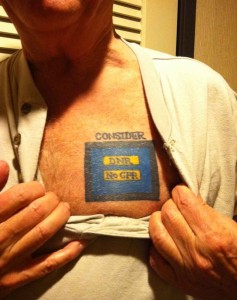My uncle, an avid jogger, trained for years with the Road Runners in New York City. He preferred to jog in Manhattan’s Central Park. He knew families of squirrels there, feeding them walnuts when he stopped to rest. He said that one squirrel would come up to him and personally request a meal. He would share updates on the red-tailed hawk known as “Pale Male” that lived on the ledge of a high rise bordering the park. Running and Central Park were my uncle’s two great loves.

Over the past few years my uncle’s cognition worsened. Slow progression at first was followed by bouts of sharp decline. Early on, my uncle shared his wish not to extend life when he no longer enjoyed quality of life. This informed perspective came from watching his own mother’s deterioration from Alzheimer’s disease. My uncle shared his wishes with the family. He designated a health care proxy to ensure that his wishes would be honored.
As the disease progressed my uncle needed 24-hour home care in his apartment. Our family hired a personal trainer to take him on runs even as he no longer understood how to put on his own gloves. He still loved running. As his needs increased, he moved into assisted living. The enclosed grounds had walking paths and gardens reminiscent of his beloved Central Park.
Sadly, he fell, breaking his hip. The fracture needed to be repaired or he would remain in agonizing pain. However, the surgeon refused to do the surgery unless my uncle rescinded his Do Not Resuscitate (DNR) order. This brings me to a dirty little secret we aren’t supposed to know about advance directives: providers may pressure patients and families to lift a DNR order. In some cases doctors ignore advance directives altogether. One reason is that DNRs can hurt the physician’s quality metrics. Physicians--surgeons in particular--do not want a patient dying on their table. Quality measures are increasingly being made available to the public. For example, in Pennsylvania you can enter a surgeon’s name to look up their surgical mortality rate.
The Patient Self Determination Act, enacted in 1991, established the right to articulate end-of-life wishes through advance directives. The right to an advance directive has existed for more than 20 years. Yet the federal law lacks the teeth to defend these patient rights. This means it is status quo for surgeons to demand that patients rescind their DNR.
Both the practice and policy realms need to address this flouting of patient autonomy and the intent of the Patient Self Determination Act. There must be a way to protect patients’ rights while easing surgeons’ worries about quality metrics. In the end, my uncle had no real choice. He had the surgery with the DNR removed. Both his hip—and the DNR—are thankfully back in place.
